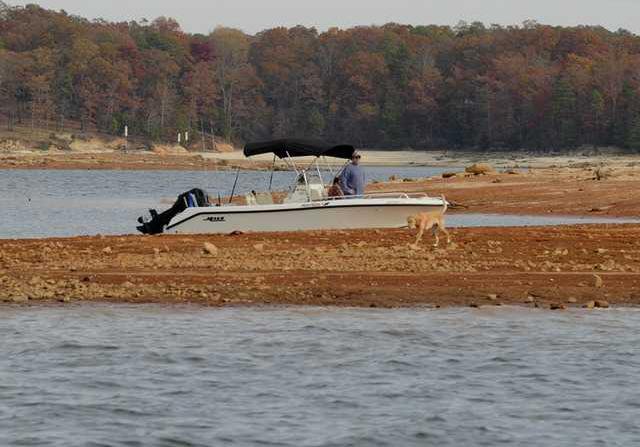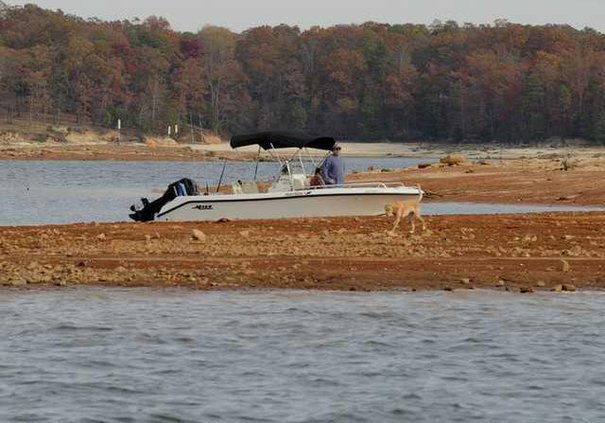FLOWERY BRANCH — The boat pulled up to the island in the middle of Lake Lanier, its occupants stopping to let a canine passenger roam free for a few minutes on the barren stretch of land.
Doesn't sound too unusual until you consider that, up until a few months ago, the island was mostly underwater.
Such is the case with the ever-dropping Lake Lanier, where what used to be submerged, such as hazardous tree stumps and sandbars, is now poking through or clearly visible.
"The advice I would give (to boaters) is if you're unfamiliar with the lake, don't go faster than you're willing to hit something," said Sgt. Mike Burgamy, Lake Lanier supervisor with the Georgia Department of Natural Resources.
A couple of DNR rangers, Ranger 1st Class Mark Stephens and Cpl. Adam Loudermilk, gave The Times a boat tour of the southern part of the lake Sunday, driving by shallow areas and places where boaters need to take caution.
Even the experienced should take heed. At one point, Stephens steered away sharply as Loudermilk pointed out a limb bobbing in the water.
"You could come right up on that at night and never know it," Stephens said, slowing his speed to idle as the boat traveled past the stump.
The water has drained so low in some places, such as between Van Pugh North Day Use Park and Van Pugh South campground, that boat travel is no longer possible.
Fortunately for the DNR, boat traffic is not nearly what it was during the summer.
"This time of year, hunting season is in full swing and with the lack of resources, we just don't have the manpower to cover lake patrols like we normally do in the summer," Burgamy said.
"The majority of your boaters at this time are going to be fishermen. You still have some sail boaters who like to get out there on windy days, but as far as recreational boating, that has really declined."
Lake Lanier, which saw its level drop to a historic low during the 2007-09 drought, is headed that way again.
The last time Lanier has been lower than it is now was March 7, 2009. The last time it was at full pool was May 1.
The lake stood at 1,058.06 feet above sea level Sunday evening, or nearly 13 feet below full pool. At the same time one week earlier, it stood at 1,058.95 feet, or nearly a foot higher.
If the lake drops by a foot per week, the lake could be reaching its historic low of 1,050.79 feet, set on Dec. 26, 2007, by late January.
After hitting that low, Lanier's water level slowly crept up, then dropped again, basically not hitting above 1,060 feet until March 28, 2009.
Georgia has been dealing with drought conditions throughout 2011.
The U.S. Drought Monitor's current map shows most of Georgia in extreme drought, with Hall County ranging from abnormally dry to severe drought.
When Lake Lanier's level dropped below 1,064 in September, the U.S. Army Corps of Engineers started a new water management schedule.
The corps has released water to maintain mandated flows downstream in the Chattahoochee and the Apalachicola Rivers.
Other reservoirs in the Apalachicola-Chattahoochee-Flint River Basin would also see lake levels drop, Lisa Coghlan, a corps spokeswoman based in Mobile, Ala., said at the time.
The corps "manages the ACF basin as a systemwide approach," Coghlan said last week. "Three of our projects will be in (the lowest conservation zone) by the first week of December."
By that time, Lanier is predicted to be at 1056.5 feet.
And "weather experts have predicted continuing dry conditions and elevations at Lanier will continue to decline," Coghlan said.
When the level dropped below 1,063 feet, the corps stopped issuing dock permits.
If conditions worsen, the DNR is looking at having to move its dock at Aqualand Marina to deeper waters.
"The lake is so far down now, we're going to have to disconnect our water and power and move (the dock)," Burgamy said. "It's going to be on the ground if we don't."
Corps officials had pinned hopes of drenching rains coming through the hurricane season, which ends Nov. 30.
Except for a few showers predicted this week, no torrential rains are in sight.

